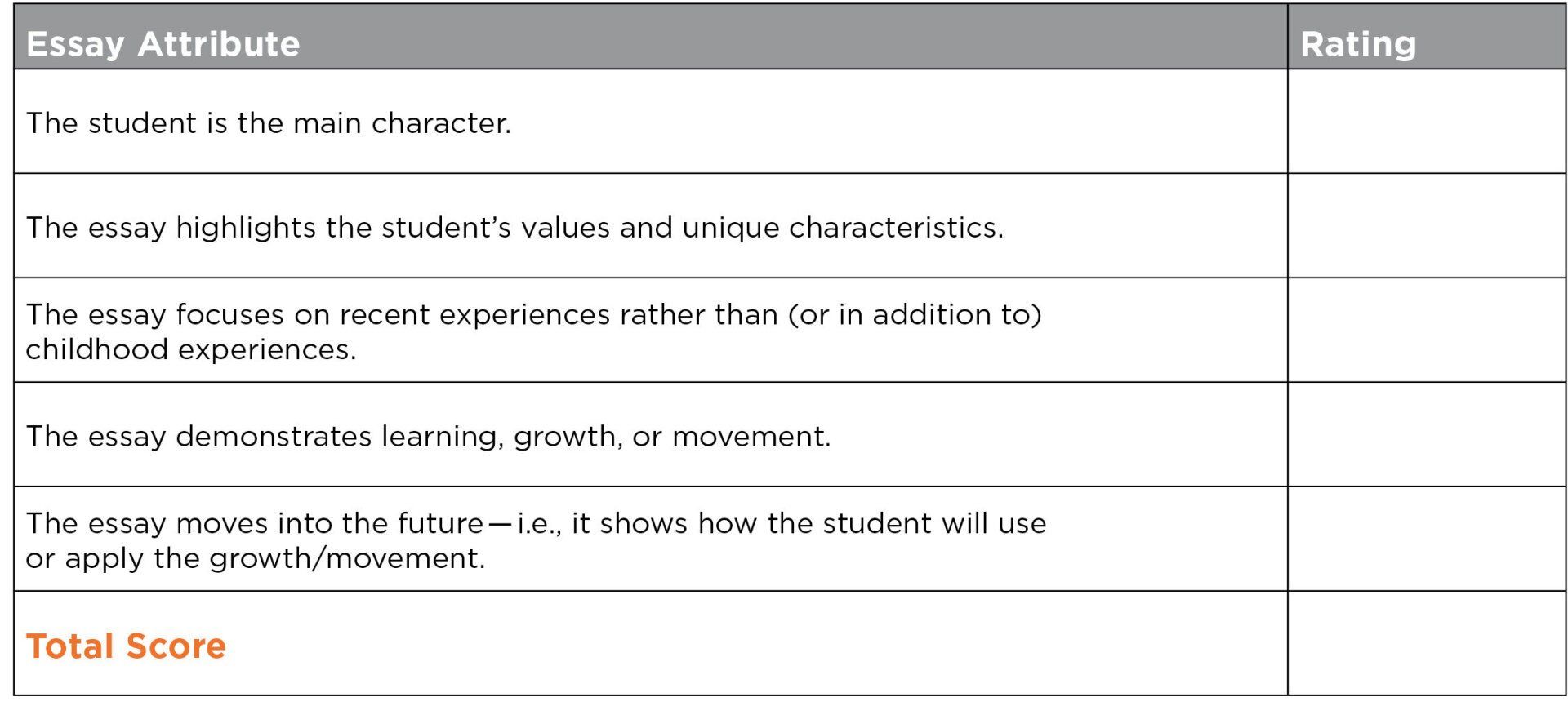This page is licensed under Creative Commons under Attribution 4.0 International. Anyone can share content from this page, with attribution and link to College MatchPoint requested.
5-Point Scorecard To Make Sure Your Personal Statement Stands Out
For seniors applying to college, the personal statement plays a significant role in your application. This essay, typically between 500 and 650 words, is crucial in the holistic review process for college admissions. As James Nondorf from the University of Chicago emphasizes, "The most important part of any college admissions essay is to write something you believe truly represents your unique voice—something that, beyond demonstrating your competencies as a writer, also displays your ability to be a creative and critical thinker and to make unique contributions to an academic community."
This essay is your primary opportunity to communicate aspects of your personality, perspectives, and relationships that a resume alone can't convey. It’s your chance to give the admissions committee a sense of who you are and how you see the world. Tamara Siler from Rice University adds, "Sometimes an essay can be the conduit for a student to reveal something to the admission committee that we would never have thought to ask. In terms of selective admission, personal statements are very important in adding needed texture to an application file."
Students are accustomed to writing academic papers with clear prompts, specific expectations, and a rubric outlining how to earn full credit. Personal essays are different. The prompts are open-ended, and the expectations can seem frustratingly vague. Embrace this freedom of thought—it's representative of what college will be like, and it's a fantastic opportunity to showcase your individuality.
Once you've completed your draft, how can you ensure your essay stands out? We’ve developed a supportive 5-point scorecard to help you assess your personal statement:

Students should give themselves a score of 1 (lowest) to 5 (highest) for each criterion on the scorecard. Aim for a total score of at least 20.
When scoring your essay, focus on the following aspects:
- The student is the main character. If you spend most of the essay talking about someone else or the technical details of a project, you may miss the chance to share important information about yourself. To earn a 5, ensure your essay reveals how the other person or the project impacted you, why you chose to pursue it, and how the experience influenced you.
- Values and unique characteristics. An effective essay gives the reader insight into your most important qualities and values, such as resilience, kindness, creativity, persistence, empathy, curiosity, or courage. Does your essay provide a focused, in-depth look into a few specific characteristics with engaging examples? If so, give yourself a 5.
- The essay focuses on recent experiences rather than (or in addition to) childhood experiences. Colleges are interested in what you’ve done in high school and who you are now. It’s fine to link childhood experiences to recent ones, but spend the majority of your essay on recent experiences. If your essay does that, give yourself a 5 here.
- The essay demonstrates learning, growth, or movement. The most interesting movies and books show character change and development. The same is true for an effective personal essay. To earn a 5 in this category, ensure your essay includes self-reflection about what you learned from an experience, how you’ve grown, and how you’ve applied what you’ve learned in new situations.
- The essay moves into the future. How will the qualities and values highlighted in your essay help you in college or your future career? A 5 in this area means you’ve spent a part of your essay, typically near the end, reflecting on how what you’ve written about will allow you to contribute or succeed in the future.
Use this scorecard to ensure your personal statement showcases your best self. If you score below a 5 in any of these areas, consider revising the essay to improve your score. Remember, you don't need to achieve a perfect score—the goal is 20 or above—but the higher you score, the more likely you are to have an engaging essay that stands out. A well-crafted essay can make a significant difference in the competitive college admissions process, and this scorecard is a helpful tool to guide you toward success. The personal statement is more than just another essay; it’s an opportunity to share your unique story and stand out to admissions committees. As Heath Einstein from Texas Christian University reminds us, "Ultimately, be yourself, and that will be good enough." Take the time to refine, revise, and ensure it truly reflects who you are.
College admissions officers emphasize two critical aspects that make a difference in great essays: authenticity and personal voice, and reflection and insight. Authenticity and personal voice are essential because admissions officers want to hear directly from you. They look for essays that showcase your unique voice and personality, reflecting your true self rather than a polished version created by others. As Christoph Guttentag from Duke University notes, "Students are often so focused on writing beautiful pieces of prose that they fail to answer the question and do not write authentic, meaningful personal statements. The hook gets in the way; the writing gets in the way." Equally important is reflection and insight. Essays that demonstrate thoughtful reflection and self-awareness are highly valued. Admissions officers want to see how you think, what you’ve learned, and how you’ve grown.


